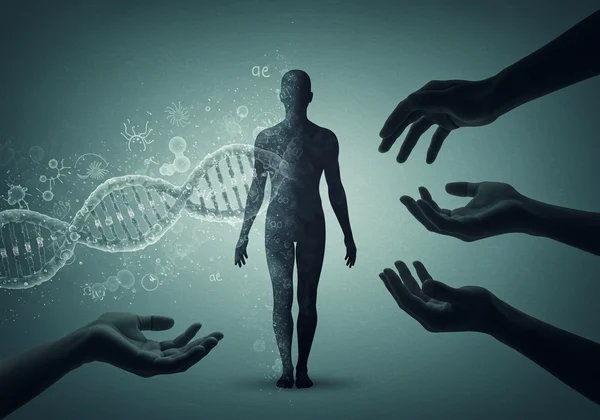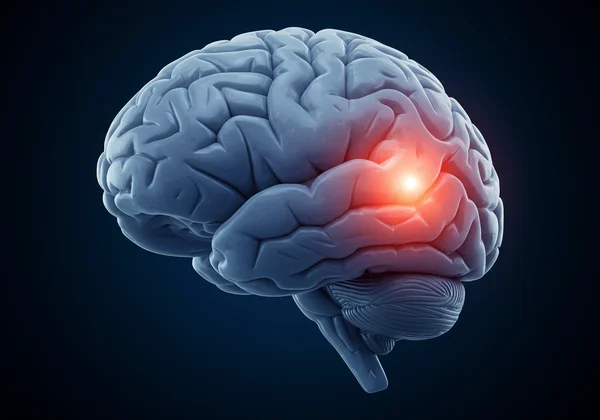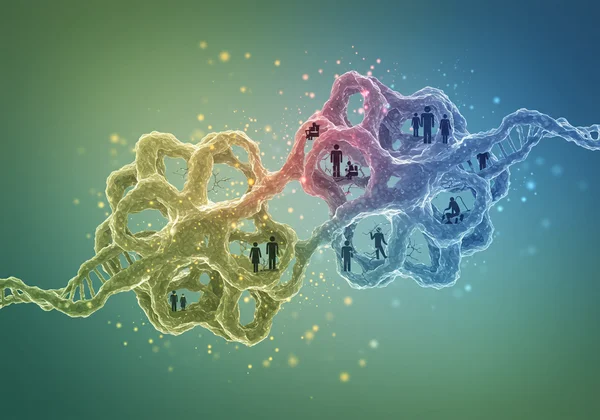Are Psychopaths Born or Made? Genetics, Environment, and the Psychopathy Test
Introduction: Unraveling Psychopathy: Nature's Blueprint or Nurture's Hand?
The concept of psychopathy has long fascinated and disturbed us, often conjuring images from fiction. But beyond the stereotypes lies a complex psychological construct defined by a specific cluster of personality traits, including a lack of empathy, manipulativeness, and impulsivity. This leads to one of the most enduring questions in psychology: are psychopaths born or made? Is this distinct personality pattern woven into a person's DNA, or is it sculpted by the hands of their environment and upbringing?

Here, we'll delve into the fascinating nature versus nurture debate. We will explore the scientific evidence behind both genetic predispositions and environmental influences that contribute to the development of psychopathic traits. Understanding these factors is the first step toward gaining clearer insight into this complex condition. If you are seeking to understand your own traits, our free psychopathy test offers a confidential starting point for self-exploration.
Nature's Influence: Genetic & Biological Roots of Psychopathy
The "born" side of the argument is supported by a growing body of scientific research pointing to biological factors. These studies suggest that some individuals may have a genetic or neurological predisposition that makes them more susceptible to developing psychopathic traits. This doesn't mean there is a single "psychopath gene," but rather that biology can set the stage.
The Genetics of Psychopathy: Twin Studies and Heritability
To untangle the influence of genes, researchers often turn to twin studies and heritability. By comparing identical twins (who share 100% of their genes) with fraternal twins (who share about 50%), scientists can estimate how much of the variation in a trait is due to genetic differences. Numerous studies have found that psychopathic traits, particularly the core affective deficits like callousness and lack of empathy, show moderate to high heritability. This indicates that genetics play a significant role in laying the foundation for these characteristics. While genes are not destiny, they can create a biological vulnerability.
Brain Structure & Function: Neurological Markers
Beyond genetics, neuroscience has identified key differences in the brains of individuals with high psychopathic traits. These neurological markers often point to irregularities in areas responsible for emotion and decision-making. For instance, research consistently shows reduced activity and structural differences in the amygdala, a part of the brain crucial for processing fear and other emotions. Similarly, the prefrontal cortex, which governs impulse control, morality, and long-term planning, often displays impaired function. These neurological findings suggest that for some, the brain's hardware for empathy and self-control may be wired differently from the start. For those curious about where they might fall on the spectrum of these traits, taking an online psychopathy test can provide preliminary insights.

Nurture's Role: Environmental Factors in Psychopathic Development
While genetics can create a predisposition, the "made" argument emphasizes that our environment plays a critical role in shaping who we become. A genetic vulnerability might never express itself without certain environmental triggers. This is where nurture enters the picture, influencing how, or even if, psychopathic traits manifest.
Early Life Experiences: Trauma, Abuse, and Neglect
One of the most powerful environmental factors is early life experiences. A history of significant childhood trauma, physical or emotional abuse, and profound neglect is frequently found in the backgrounds of individuals who develop antisocial and psychopathic traits. A chaotic, unstable, or violent upbringing can disrupt healthy emotional development and teach a child that manipulation and aggression are necessary tools for survival. These adverse experiences can shape a worldview devoid of trust and emotional connection, fostering the detachment and callousness characteristic of psychopathy.

Parenting Styles & Social Learning Theories
Beyond overt trauma, parenting styles and social learning theories also offer crucial insights. A parenting style that is overly permissive, inconsistent, or conversely, excessively authoritarian and harsh, can contribute to the development of these traits. Social learning theory suggests that children learn behaviors by observing others. If a child is raised in an environment where they witness manipulative, dishonest, or unempathetic behavior from caregivers, they may model these actions, internalizing them as normal ways to interact with the world. Without positive role models for empathy and prosocial behavior, a child with underlying vulnerabilities is more likely to develop along a psychopathic trajectory. Exploring these patterns can be complex, and a psychopathy spectrum test can help organize these reflections.
The Complex Interplay: A Biopsychosocial Perspective
The reality is, whether someone is 'born' or 'made' with psychopathic traits isn't a simple either/or scenario. The most accurate answer is that psychopathy arises from a complex and dynamic interplay between nature and nurture. Modern psychology favors a biopsychosocial perspective, which acknowledges that genetic vulnerabilities, neurological factors, and environmental influences all interact to shape an individual's personality.
Gene-Environment Interactions: More Than Just Sum of Parts
The concept of gene-environment interactions is key to understanding this complexity. This theory posits that individuals with a certain genetic makeup may react to their environment differently than others. For example, a child with a genetic predisposition for impulsivity and low fear may thrive in a structured, supportive environment but may develop significant antisocial behaviors in a chaotic or abusive one. The genetic risk doesn't cause the outcome on its own; it requires a specific environmental context to be "activated." The result is truly more than the sum of its parts.

Risk vs. Determinism: Not All Factors Lead to Psychopathy
It is essential to understand the difference between risk vs. determinism. Having genetic vulnerabilities or experiencing a difficult childhood are risk factors, not a life sentence. Many people with these risk factors do not develop psychopathy, and not everyone with high psychopathic traits has a clear history of trauma. This underscores the complexity of human development and the importance of protective factors, such as a strong support system or positive relationships, which can buffer against these risks.
Understanding Your Traits: The Role of a Psychopathy Test
This is why educational tools are designed for insight, not diagnosis. A well-structured psychopathy test can help you understand potential traits and behavioral patterns without making definitive labels, serving as a guide for self-reflection. This is why tools like our scientific-inspired test are designed to provide clarity on your unique personality profile.
Beyond the Debate: Actionable Insights and Self-Discovery
The question of whether psychopaths are born or made is not a simple one. The scientific consensus points to a multifaceted origin story where genetic predispositions and biological factors create a vulnerability that is either expressed or mitigated by environmental influences throughout life. Neither nature nor nurture holds the sole explanation; instead, their intricate dance shapes the personality traits we observe.
Understanding this complexity is the first step toward demystifying psychopathy and moving away from harmful stereotypes. It allows for a more nuanced and informed perspective on human behavior. This knowledge is not just for academics; it is for anyone seeking to understand themselves or the people around them better.
Ready to explore your own traits or gain a deeper understanding of this psychological landscape through a reliable psychopathy test? Take our free psychopathy test today for preliminary insights. For a more comprehensive analysis, consider our unique AI-powered report, which offers personalized feedback on your unique personality profile, including potential strengths and challenges.
Answering Your Questions About Psychopathy
Are psychopaths purely born, or can they be made?
Neither. Psychopathy is best understood through a biopsychosocial model. An individual may be born with a genetic or neurological predisposition (nature), but environmental factors like childhood trauma, neglect, and social learning (nurture) play a crucial role in whether and how these traits develop. It's the complex interaction between the two that matters most.
What are the early signs of psychopathy in childhood?
While psychopathy is an adult construct, related behaviors in children are often referred to as conduct disorder with callous-unemotional traits. Early signs can include a persistent pattern of aggression towards people or animals, deliberate destruction of property, deceitfulness or theft, and a serious violation of rules. Crucially, these behaviors are coupled with a lack of guilt, empathy, or concern for the feelings of others.
How do I know if I or someone I know might have psychopathic traits?
Identifying these traits can be challenging. Key indicators include superficial charm, a grandiose sense of self-worth, a lack of remorse or empathy, manipulativeness, and chronic antisocial behavior. However, self-assessment is difficult, and observing others can be misleading. A helpful and responsible first step can be using an educational tool, like an online screening test, to gain structured insight. For any deeper concerns, it's always best to connect with a qualified mental health professional.
Can a person with psychopathic traits ever be a "good" person?
The concept of "good" is personal and complex. Individuals with high psychopathic traits may lack the innate empathy that often motivates prosocial behavior in others. However, they can learn to follow societal rules and act in ways that are not harmful, often motivated by self-interest (e.g., avoiding punishment). While their internal experience may differ, they can certainly control their behavior and contribute to society in non-destructive ways.